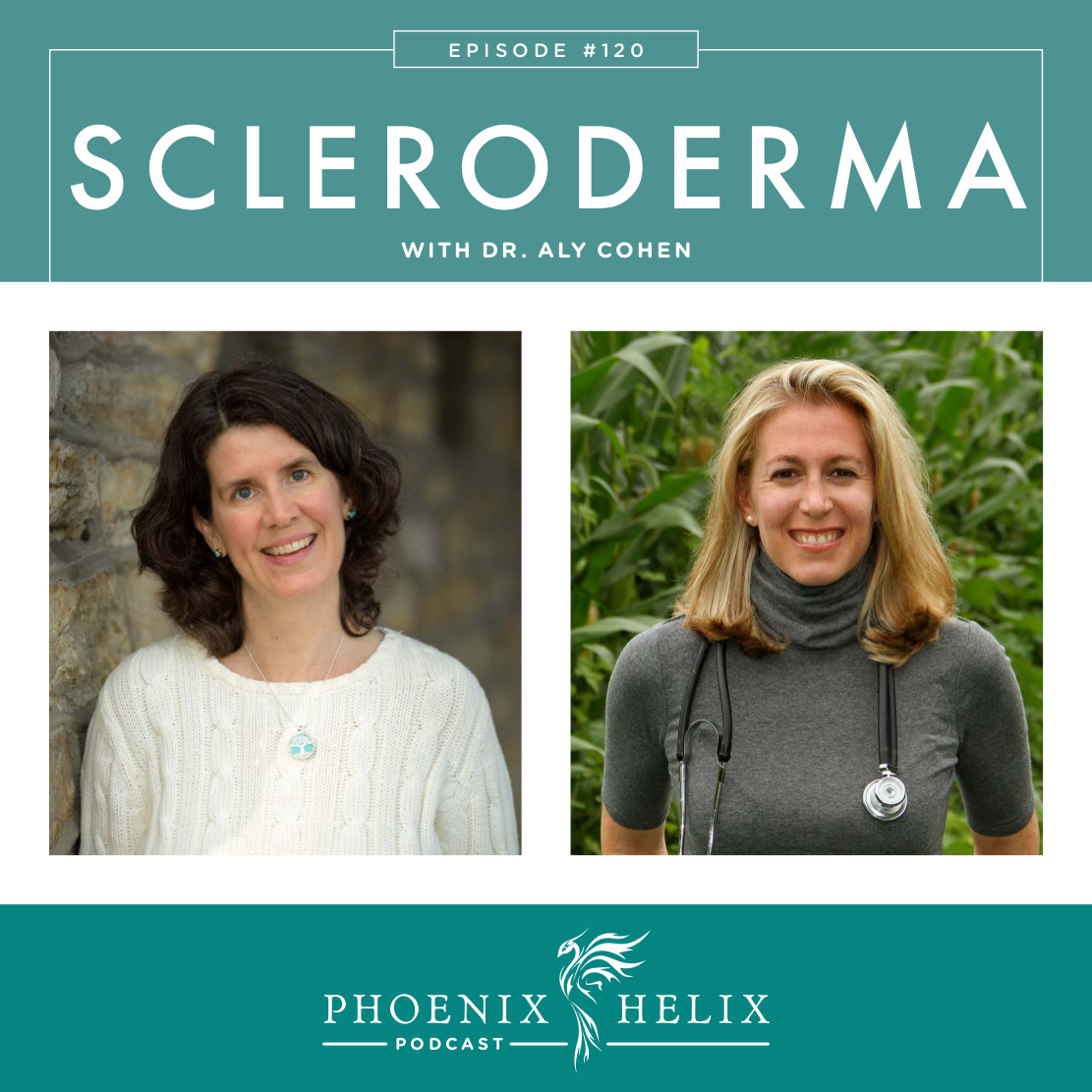
Scleroderma Spotlight
With autoimmune disease, we all have more in common than not, with similar root causes and similar treatments. That’s why most of my episodes speak to general topics that can help us all. But occasionally I do diagnosis spotlights, taking a deep dive into one specific autoimmune disease or a category of autoimmune disease. In past episodes, I’ve spotlighted Lupus, Celiac Disease, Hashimoto’s Thyroiditis, Rheumatoid Arthritis, Inflammatory Bowel Disease, and Neurological Autoimmune Conditions. Today, we’re focusing on Scleroderma, and my guest is Dr. Aly Cohen. She is an integrative rheumatologist practicing in Princeton, New Jersey, who also consults with people worldwide. Her approach combines the wisdom of Western and Eastern Medicine together.
Listen to the Show
- Subscribe to my podcast through your favorite podcast app: iTunes, Stitcher, Google, TuneIn, Spotify, Amazon, etc.
- You can also listen to the episode right here through the player below, and if you subscribe to my newsletter you’ll get notified of future episodes.
Podcast: Play in new window | Download
Show Notes
- Intro (0:00)
- Thank You to Our Podcast Sponsor – Paleo on the Go (2:14)
- A frozen meal delivery service, 100% of their menu is compliant with the elimination phase of the paleo autoimmune protocol (AIP). They have over 5o items, including entrees, side dishes, broth, AIP-friendly bacon, and desserts.
- Use the code PHOENIX for 10% off your first order.
- Meet Dr. Cohen (3:28)
- Dr. Aly Cohen is an integrative rheumatologist who combines Western and Eastern approaches in her practice. She received her original training through the University of Pennsylvania and the Hahnemann University Hospital School of Medicine. She pursued further training in medical acupuncture through the Helms Institute at UCLA, and received a scholarship to study with Dr. Andrew Weil at the University of Arizona’s Center for Integrative Medicine. She currently practices in Princeton, NJ, and also offers phone consults to patients worldwide.
- Dr. Cohen is especially passionate about environmental medicine and created an educational platform called The Smart Human.
- The Different Types of Scleroderma (7:13)
- In scleroderma, the cells of the stretchiest parts of the body become tight and harder to stretch. This can impact the skin, heart, lungs, kidneys, and gastrointestinal organs.
- Scleroderma is divided into two categories: localized and generalized.
- Localized affects the skin but not the organs. It’s divided into two categories as well: morphea and linear. Morphea involves hard plaques of skin on the trunk of the body. Linear is a hard line of skin that can happen in many places on the body including the face. Facial linear scleroderma is also called Coup de Sabre “stroke of the sword”, because it can look like a sword scar through the face.
- Generalized scleroderma (also called systemic sclerosis or SSc) affects both the skin and the organs. This is the more serious version of the disease. It’s also divided into two categories: limited and diffuse, depending on the location of the skin involvement. Limited (also called CREST syndrome) is usually limited to skin involvement on the periphery of the body. Diffuse tends to manifest closer to the center of the body. Each type carries different risks.
- Classifying the type of scleroderma correctly is essential to effective treatment. Each type is associated with difference risks and symptoms, and for that reason each type requires different tests, monitoring, and treatment options. Also each patient will have unique symptoms within their category. You cannot treat all scleroderma patients the same.
- Only a small percentage of people with Raynaud’s phenomenon develop scleroderma. However, almost everyone with scleroderma has Raynaud’s symptoms. When and how the Raynaud’s symptoms appear in relation to other scleroderma symptoms helps the doctor diagnosis the type of scleroderma and prognosis.
- Scleroderma is more common in women than men, at a ratio of 4:1. African-American women tend to develop the disease younger and are more likely to have systemic involvement. And Choctaw Indians have the highest prevalence within the US.
- Resource article: What Is Scleroderma?
- What Is Mixed Connective Tissue Disease (MCTD)? (18:58)
- Sometimes autoimmune symptoms present in a pattern that doesn’t fit the diagnosis of a specific autoimmune disease like scleroderma or lupus, but has some overlap between them. MCTD is often the label given in these situations. It’s clear that autoimmunity is present but it’s a mixed diagnosis, and has a different prognosis (lower risks) than a diagnosis of systemic scleroderma.
- Diagnosing Scleroderma (21:45)
- Blood testing for a wide range of antibodies as well as inflammatory markers.
- Physical exam, classifying distribution of skin involvement.
- Baseline tests for heart, lung, and kidney function.
- CREST symptoms: Raynaud’s, calcinosis, esophageal reflux, sclerodactyly, telangiectasia.
- Managing Scleroderma Symptoms (25:06)
- Dr. Cohen takes an integrative approach, offering both conventional and alternative options.
- Raynaud’s – She recommends behavior changes to manage temperature in the fingers and toes (rubber gloves when washing dishes, thinsulate gloves as needed during daily activities, etc.) Low-dose blood pressure medication can improve symptoms, but many people with scleroderma already have low blood pressure, so that needs to be monitored closely. Topical nitroglycerin cream can be helpful as well.
- Acid reflux – Proton pump inhibitors are the conventional therapy. Dr. Cohen prefers supplements that can soothe symptoms without disrupting the gut microbiome, such as DGL and D-limonene during the day, and low-level melatonin to help keep the esophagus closed overnight.
- Shortness of breath related to lung disease – Medications, inhalers and IV infusions are now available to increase lung capacity. Conventional options have improved greatly in the past 20 years.
- Immunosuppressant medications – Dr. Cohen isn’t anti-medication, but she also doesn’t use them reflexively. She sees if other approaches can work just as well first. Topical capsaicin cream can sometimes help soothe and soften the skin. Low-dose naltrexone (LDN) has been shown to help with pruritus (itchy skin) in scleroderma. But there are also circumstances where medications like methotrexate and/or CellCept are appropriate.
- Thank You to Our Podcast Sponsor – Bonafide Provisions (31:35)
- Bonafide Provisions makes true, traditional bone broth – that means it gels, is certified organic, uses only grass-fed & pasture-raised bones, and it’s frozen (no preservatives or high-heat processing.) They also triple filter the water used in the broth, cook in stainless steel pots, and cool it completely before adding it to their BPA-free packaging.
- They sell 4 varieties: beef, chicken, turkey, and a frontier blend which uses a combination of beef, turkey, lamb & bison bones. All of their regular bone broth is compliant with the elimination phase of the paleo autoimmune protocol. They also sell 6 varieties of soup, and 2 of those are AIP-Friendly: the butternut squash soup, and the chicken vegetable.
- They have a new line of ketogenic bone broth that are sold in 8 ounce drinkable cups. These aren’t AIP-friendly. However, for those of you following a ketogenic diet who have reintroduced grass-fed butter and/or black pepper back into your diet, these are a great option. And if you like the idea and want an AIP version, just add some MCT oil and your favorite herbs to their standard bone broth, which is AIP-friendly.
- Place an order here, and use the code PHOENIX for 20% off your first order.
- Dr. Cohen’s Dietary Recommendations (33:15)
- Dr. Cohen isn’t a paleo doctor. When it comes to patient recommendations, she starts with the basics – removing processed foods and all of the chemicals they contain.
- She recommends people buy organic when possible, and if buying conventional fruits and vegetables, wash them in a solution of 1 part vinegar to 3 parts warm water, which will remove much of the pesticide residue.
- Clean drinking water is also one of her top recommendations.
- The Smart Human Program (36:40)
- The Smart Human is an environmental education platform created by Dr. Cohen to help people live healthier lives. She posts regularly on her blog, Facebook, and Instagram.
- Studies have shown that occupational exposures to certain toxins have been linked to higher rates of scleroderma.
- Podcast Interview with Dr. Aly Cohen: Detoxify Your Home.
- Helping Patients Make Healthy Changes (38:57)
- Dr. Cohen doesn’t believe in pressuring patients to make multiple changes at once. During the first appointment, she asks each patient about their obstacles to change. What are their current abilities, responsibilities, and challenges? Then, each patient tells her what they feel capable of doing. They make one goal at a time, and when the patient has achieved that goal, they make another one. She provides guidance and education, and also brainstorms with them on how to set up supports for success. Lastly, she sees her patients as great resources as well. When they find something that works for them, she shares that with other patients.
- Functional Medicine Testing (43:44)
- Functional Medicine and Integrative Medicine share many of the same tenets, emphasizing the importance of nutrition, lifestyle, sleep, environmental factors, the microbiome, etc. Where they differ is that functional medicine practitioners tend to run more tests. Dr. Cohen doesn’t feel that’s necessary most of the time. She begins with the testing that is covered by the patient’s insurance, and in addition to conventional labs, insurance will often pay for nutrient testing as well as heavy metal testing. Then, behavioral changes have the biggest impact on a person’s health, regardless of tests. So, she only runs further testing as needed, on a case-by-base basis. She’s very aware of the financial burden of chronic illness and is therefore cautious of requiring tests that cost additional money.
- Building a Healthy Microbiome (46:16)
- We have multiple microbiomes in our body: gut, skin, brain, lung, and more. Ideally, we live in harmony with our microbiome in a way that supports health. However, there are many things that can disrupt a healthy microbiome, including pesticides in food, chlorine in drinking water, certain medications, and more. That disruption can cause health issues bodywide, particularly when it comes to the health of the immune system. Supporting gut health is a big part of Dr. Cohen’s patient recommendations.
- Dr. Cohen’s Favorite Supplements (48:55)
- Multivitamin.
- Fish Oil.
- Curcumin.
- Probiotic.
- She sees these as foundational supplements that can help most people. However, there are contraindications for each one. For example, fish oil is a blood thinner, and all supplements can interact with medications. It’s also possible to take too much. She recommends working with a practitioner to guide your needs.
- Medication Decisions (52:26)
- Dr. Cohen discusses both benefits and risks when guiding her patients on this decision. Her primary tenet is to do no harm.
- The first question is whether or not your condition can be life-threatening. Localized scleroderma doesn’t have organ involvement, whereas generalized scleroderma does, so the risks between the two classifications varies greatly.
- Scleroderma presentation also varies a lot between individuals. She looks at patient history, past complications, current symptoms, lifestyle changes, and alternative treatments. Sometimes, she supports her patient in testing the reduction or removal of a medication. Other times, she’s honest when she thinks it’s too big a risk. Conventional medication is not always bad. It can be life-saving.
- She also believes in a team approach to medicine. She has an ayurvedic healer, a reiki master, and a cognitive therapist in her office. She also has a network of colleagues for referrals, including an expert in sleep evaluation. All of these things can make a big difference in a patient’s health and their need for medication.
- Resource: Ep 48. Medication Decisions.
- Treatment Goals: Remission vs. Management (57:51)
- Scleroderma isn’t an autoimmune disease that’s defined by remission. Instead, the goal is to manage the disease well and improve symptoms wherever possible.
- Stem cell transplants might be a possibility in the future. Right now, the research is quite new but shows promising results.
- Resource: Ep. 110: Stem Cell Research.
- Outro (1:00:29)
- Dr. Aly Cohen is accepting new patients locally in Princeton, NJ, and she does telehealth consults with people around the world. She also has a passion for non-toxic living. She’s the co-author of the textbook, Integrative Environmental Medicine and has written a new book for consumers: Non-Toxic: Guide to Living Healthy in a Chemical World. Follow her on social media for educational posts @thesmarthuman. She also has a Ted Talk: How to Protect Your Kids from Toxic Chemicals.
- Eileen (your podcast host) is the author of multiple books, written to help people thrive with autoimmune disease. Learn more on the Books Page.
- If you like this podcast, follow or subscribe through your favorite podcast app. You can also subscribe to Eileen’s biweekly newsletter.
- Check out the entire archive of podcast episodes.
You May Also Be Interested In
Spreading the Word
If you like the podcast, please leave a positive review in iTunes. It would mean the world to me, and also helps others find the podcast. Here are some quick instructions using your iPhone:
- If you are already subscribed to my podcast: (1) Click the purple podcast icon. (2) At the bottom of the screen, click Library. (3) At the top of the screen, click Shows. (4) Click the Phoenix Helix podcast image. (5) Scroll down the page, and you’ll see Ratings and Reviews. Scroll down a little bit more and click on Write a Review. This will bring up the review screen. Tap 5 stars (if you love the podcast), and then click in the title box, and it will bring up the keyboard. Enter a title and short review. (6) Click Send in the upper right corner. (7) Thank you! Positive reviews give the podcast a higher search ranking in iTunes, helping people find it and letting them know it’s a quality podcast and worth their time to listen.
- If you haven’t subscribed to my podcast: (1) Click the purple podcast icon. (2) In the lower right corner, click the magnifying class. (3) Type Phoenix Helix in the search box. (4) Click the podcast cover in the Show list. (5) If you’d like to subscribe, click the + sign at the top of the screen. (6) To write a review, scroll down the page, and you’ll see Ratings and Reviews. Scroll down a little bit more and click on Write a Review. This will bring up the review screen. Tap 5 stars (if you love the podcast), and then click in the title box, and it will bring up the keyboard. Enter a title and short review. (7) Click Send in the upper right corner. (8) Thank you! Positive reviews give the podcast a higher search ranking in iTunes, helping people find it and letting them know it’s a quality podcast and worth their time to listen.







